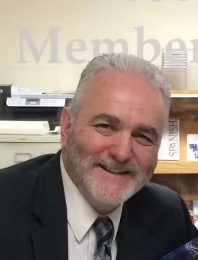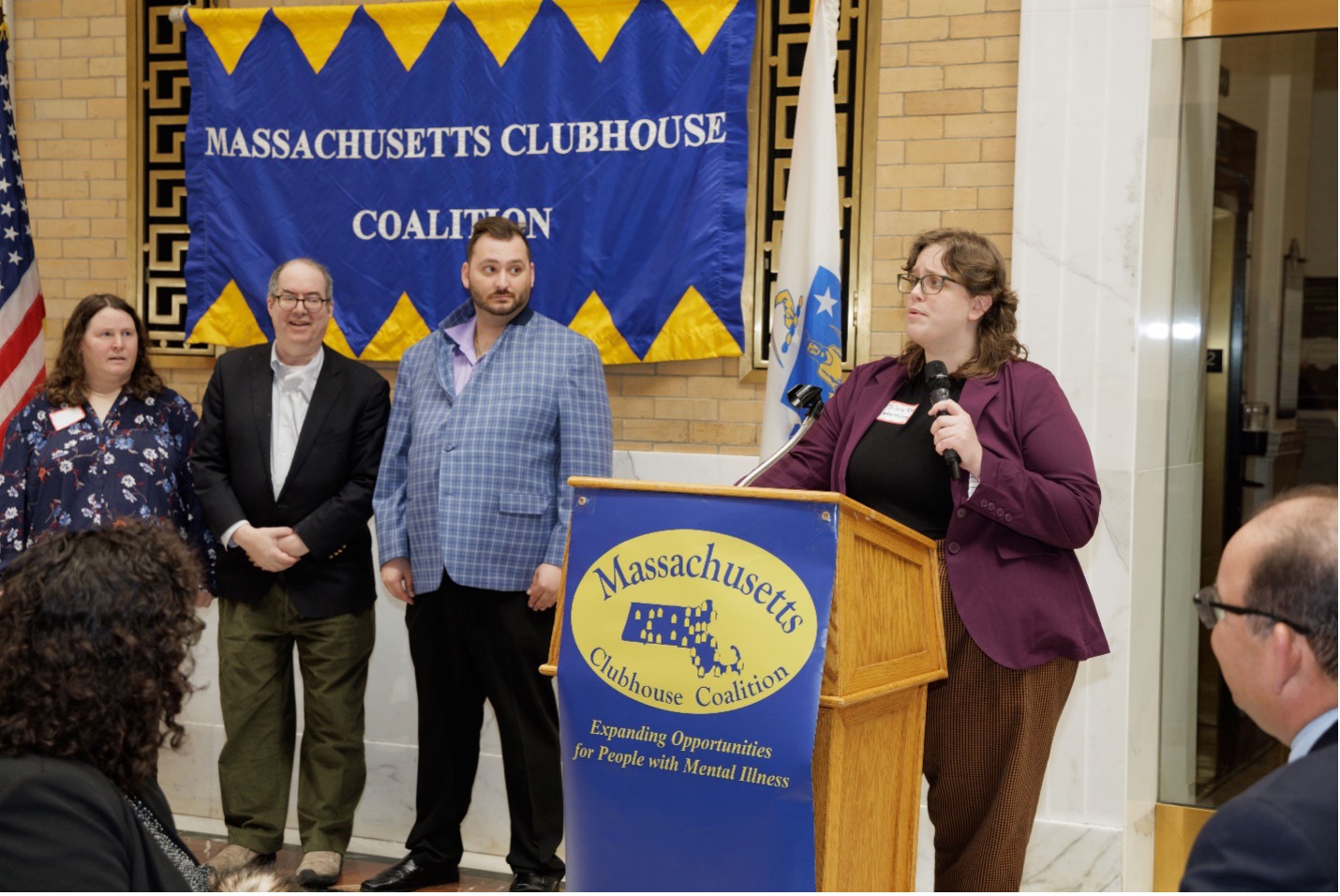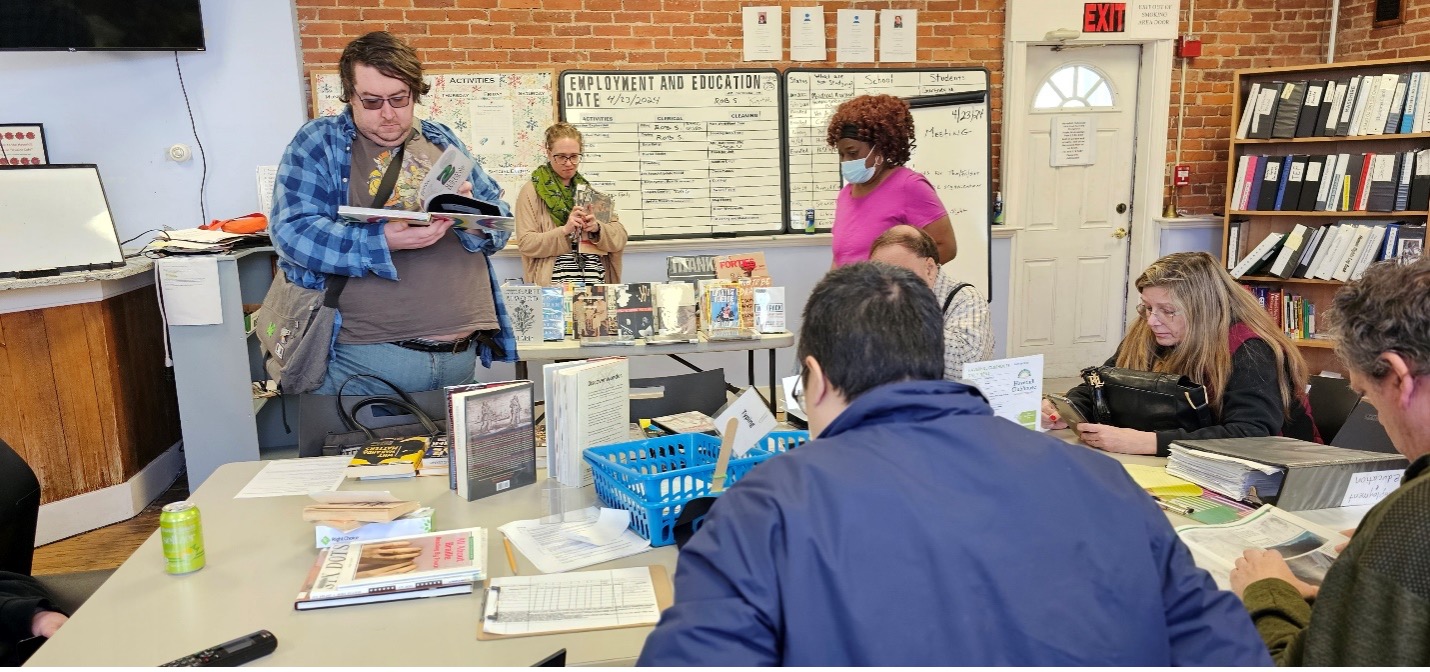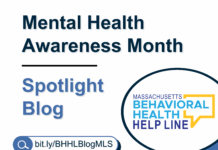Written by Tom Coppinger, Executive Director, Massachusetts Clubhouse Coalition

A few weeks ago, the Massachusetts Clubhouse Coalition (MCC) met with representatives of the Massachusetts Board of Library Commissioners (MBLC), the Massachusetts Library System (MLS), and with some folks from the Department of Mental Health’s Central Office. The major topic of discussion was to explore ways to get Clubhouses more involved with libraries, building on pre-existing examples of Clubhouses and their local libraries.
During this conversation it was clear that Clubhouses and libraries share similar values and missions, from a safe place to come, judgement free, to the sharing of resources, and the importance of treating all members and patrons equally.
We are grateful for the opportunity to present who we are in this blog, and the many services and commonalities that can make Clubhouses and libraries great community partners!
In this blog post:
- About the MCC
- What are Clubhouse Services?
- Types of Employment
- What is Dual Recovery Anonymous (DRA)?
- Examples of Clubhouse/Library Partnerships
- How to Connect Library Patrons with Clubhouses
- How Library Staff can Connect with the MCC
About the MCC
The MCC is a non-profit organization that has been supporting Clubhouse communities since 1991, and is dedicated to assisting adults with mental health challenges to live full, productive, and meaningful lives in the community.
Membership to the Coalition is open to Massachusetts Clubhouses that are accredited or seeking accreditation with Clubhouse International. In Massachusetts there are 36 Clubhouses funded through the state and operated under contracts awarded through the state’s Department of Mental Health. To offer Clubhouse support in all of the 351 cities and towns in the Commonwealth, each Clubhouse is assigned a Catchment Area that specifies the district that the Clubhouse provides services. To find a Clubhouse in your area, you can visit the Massachusetts Clubhouse Coalition website.
There are over 340+ Clubhouses in the world, in 34 countries. Quality accreditation is awarded to Clubs who are in compliance with the evidence based International Clubhouse Standards. The Standards also serve as a “bill of rights” for members and a code of ethics for staff, board, and administrators. The Standards insist that a Clubhouse is a place that offers respect and opportunity to its members. Clubhouses are a powerful demonstration that people with mental health challenges can and do lead normal, productive lives. Clubhouse International is a non-profit organization that helps start and grow Clubhouses globally where people with mental illness can go to get their lives back.
The MCC’s goals are to provide:
- Support and Training Clubhouses to achieve Quality Accreditation
- An annual Employment Celebration to Honor Employers at the Statehouse
- Support for the development of Employment and Educational opportunities for members
- Advocacy to Educate and raise awareness around our effectiveness, and the importance of social supports for people with mental health and addiction challenges
- Advocacy to support funding initiatives for Clubhouses, mental health services, and other areas that support our members and communities (i.e. transportation, housing, young adult services, technology, language accessibility, clubhouse training, etc.)
- Organize regional Clubhouse conferences
- Leadership development opportunities for our members and staff, to ensure a strong future for our Coalition, and that every individual’s voice matters
- Oversight for our incredibly successful Dual Recovery Anonymous Project
- Mentoring model across the state, Clubhouses supporting each other locally
- Promotion for our regular committee meetings, membership, employment and education, advocacy and Dual Recovery.
- Organization and support for member stories to inspire others and educate the public that recovery is real and probable given the proper opportunities and support, such as those provided by our Clubhouse
- Organize statewide meetings and events to bring our Clubhouse communities together, agree on policies and direction, and strengthen our relations and our commitment to our great Coalition
What Are Clubhouse Services?
The Clubhouse Model is first and foremost an intentional community. Much more than simply a program, or a social service, a clubhouse is a community of people who are working together toward a common goal. It is a partnership model with members, individuals with a history of mental health challenges, and staff and social practitioners, working side by side, running the business of the Club, during what we call the work ordered day.
The work ordered day provides the opportunity for members to be involved in all aspects of Clubhouse work, focusing on the strengths, talents, and abilities of members in running the daily operations of the Clubhouse. Tasks may include making lunch, answering phones, job search, developing newsletters, club finances, maintenance, administrative duties, reception, tours, etc. Hours of operation are similar to those of regular businesses in the community, generally Monday – Friday 9 a.m. – 5 p.m., or 8 a.m. – 4 p.m.
All work is done exclusively to enhance the Clubhouse community, with the primary goal of developing individual opportunities for members like employment, education, housing, health and wellness, leadership, peer support, social and recreational activities, young adult programs, and senior programs. The work ordered day helps individuals learn new skills, hone their talents, build dignity, develop a sense of belonging, and make progress towards their goals
As the key component of our “Recovery through Work” model we have a three-tiered employment program. You can learn more by visiting the Massachusetts Clubhouse Coalition website or by watching our webinar: Clubhouse Resources for the Commonwealth.
Types of Employment
Clubhouse philosophy is founded on the belief that recovery from mental illness is greatly facilitated by purposeful work, including paid employment. The Clubhouse Rights are as follows: A right to a place to come – A right to meaningful work – A right to meaningful relationships – A right to a place to return.
The Clubhouse Model facilitates three key forms of paid employment in the community: Transitional Employment, Supported Employment, and Independent Employment. Clubhouse members are guided through the process of finding gainful employment using this system and are given opportunities at a pace that reflects their strengths and needs. Additionally, TE, SE, and IE positions (as they are affectionately referred) grant local employers with possibilities found only in collaborating with Clubhouses and through this shared effort, fight stigma and misconceptions surrounding mental illness. For a detailed understanding of the scope of Clubhouse employment, please see below.
Transitional Employment
- Part-time, entry-level positions
- These positions are time limited and last for six to nine months
- Jobs are generally Monday through Friday and during typical work hours
- Consistent job duties and schedules that are managed by the Clubhouse
- The Clubhouse staff learn the job and train the member until all parties agree the member is able to work independently
- Absence coverage is guaranteed by the Clubhouse and free of charge to the employer
- More intensive Clubhouse support
- Enables members to develop skills and self-confidence
- A stepping-stone to long-term employment success
Supported Employment
- The Clubhouse has a relationship with the employer
- Clubhouse staff assist the member in training and mastering the job
- The level of support is defined by the member and tailored to their individual needs
- Not time-limited and absence coverage is not provided by the Clubhouse
- A Supported Employment job may become Independent Employment if less support is needed
Independent Employment
- Members may obtain these jobs with or without Clubhouse assistance
- Not time-limited and absence coverage is not provided by the Clubhouse
- Supports are provided at the Clubhouse but not on the job site (For example: assistance with developing a resumé, conducting a job search, dressing and interviewing for jobs, addressing and resolving workplace issues that may arise, and assistance with tax and benefit/healthcare issues)
What is Dual Recovery Anonymous (DRA)?
Dual Recovery Anonymous (DRA) is a 12-Step self-help program for individuals who experience both an addiction and an emotional or psychiatric illness. Adults recovering from any addiction and any mental health challenge are welcome to attend. Massachusetts-DRA embraces all participants striving to achieve an improved sense of emotional wellness by using the 12 Steps. The local DRA community continues to grow with over 50 virtual and in-person meetings open to the public. Typically, Massachusetts-based DRA meetings are developed through the support of Clubhouses, Recovery Connection Centers, and other state funded programs.
For more information on DRA, contact:
MCC DRA Coordinator Julie Sprenkle, PsyD: julie.sprenkle@yahoo.com
Examples of Clubhouse/Library Partnerships
Elliot House

Elliot House, a service of Riverside Community Care, has partnered with the Newton Free Library for over two decades, helping dozens of individuals living with mental health challenges to return to work, regain hope, and lead fulfilling lives. One of the key ways the library has done this is by ensuring Elliot House members have access to Transitional Employment (TE) opportunities as library pages.
A TE starts with a selection process at the Clubhouse. The member chosen is onboarded and trained by Elliot House staff who have been trained on the position. Until the member feels comfortable working on their own, Elliot House staff provide on-site job training and coaching through visits with the member and the employer, always maintaining an open line of communication. The member works the position for six to nine months, with the staff checking in about their job performance as well as their goals for the future.
As their TE comes to an end, they are assisted with their accomplishing their next steps, while a new member is selected, onboarded, and trained. Through this process, the library has offered dozens of opportunities over the years to Elliot House members and have helped put them on a path to success!
Haverhill Clubhouse

For about a year, the Haverhill Public Library has been visiting the Haverhill Clubhouse on the fourth Tuesday of every month, bringing a wide array of media for members to examine and check out for use. This includes everything from mystery novels, to comic books, movies on DVD and Blu-ray, and even old radio shows on CD. These visits have been popular with members, many of whom were unaware the library had such a deep selection of media to browse through. The visiting librarian also brings with her flyers and leaflets on events and programs that the community is welcome to participate in. These visits have brought more interest in community events and awareness of what the library has to offer.
This month, the Haverhill Public Library hosted their annual free Comic Con and the Haverhill Clubhouse took a trip there as a group to explore. It was a great event where members were able to meet and chat with local and semi-local artists. Everyone that attended had a good time and we will be sure to attend the event next year. We are currently exploring ways the library can support us starting a book club for members and many are excited for what comes next.
How to Connect Library Patrons with Clubhouses
Your patrons can choose which Clubhouse they would want to contact.
The easiest way to connect library patrons would be to first figure out the Clubhouse who represents the town or city that the library is located in. Visit the directory on the MCC website to learn more.
Once you have located the Clubhouse, I recommend calling the Clubhouse Director and explaining you are calling from the library with a possible referral and request a tour of the Clubhouse, or give the individual the phone number, name of the Director, and the address. If the Director is not there, you should ask for the intake coordinator.
On paper this seems like a simple process. However, some of the individuals we are talking about have been marginalized by their circumstances and may need more support to agree to go to a Clubhouse, or anywhere for that matter. Both Clubhouses and libraries are a safety net for many homeless individuals and those discharged from hospitals with mental health challenges. It is a safe, judgment free, and open access community that makes it easy for these folks to walk through the doors for the respite they certainly need.
Genesis Club in Worcester, an International Training Base for Clubhouses, has discussed the possibility of setting up a time and day to do outreach at the Worcester Public Library. This would include staff and members working a table at the library at a certain day and time weekly. The library could direct patrons who they think could benefit from Clubhouse services and encourage them to meet with the Club. Genesis has the benefit of members working at the library who could be an invaluable resource to help guide these individuals.
Of course, this model includes targeting resources to do this on a weekly basis and this is a decision to be made by each Club based on their situations.
We are hoping that through this blog, Clubhouses will reach out to their local libraries and introduce themselves. Like most successful collaborations, the relationships need to be built on the local level.
How Library Staff can Connect with the MCC:
Library staff can connect with the MCC by emailing or calling me below:
Tom Coppinger, Executive Director
- Email – tcoppinger.mcc@gmail.com
- Website – massclubs.org
- Phone – 781-777-5439
For more information on Dual Recovery Anonymous, contact:
MCC DRA Coordinator Julie Sprenkle, PsyD
- Email – julie.sprenkle@yahoo.com
Blog coordinated by:
Ally Dowds, Consultant, Services to Special Populations, Massachusetts Board of Library Commissioners
Michelle Eberle, Consultant, Massachusetts Library System
Jack Martin, Communications Manager, Massachusetts Library System


